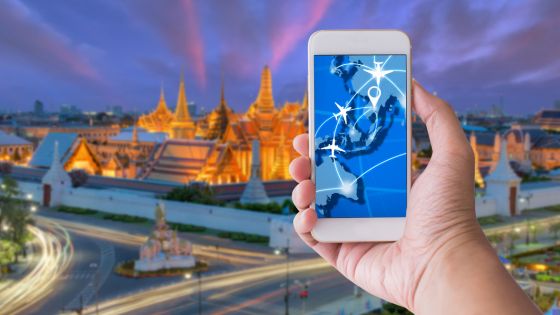Technology has had a profound impact on nearly every industry, and travel is no exception. Technological advancements have revolutionized modern travel From how people plan trips to how everyone experiences new destinations. These innovations have made traveling more efficient, convenient, and accessible, transforming what used to be a time-consuming and expensive process into something that can be done with the touch of a button. Below are some of the key ways technology is reshaping the travel experience.
1. Online Booking and Travel Apps
Gone are the days when travelers had to rely on travel agencies to book flights, hotels, and tours. Today, online booking platforms like Expedia, Booking.com, and Airbnb allow travelers to book every aspect of their trip independently and on their own schedule. These platforms provide access to millions of accommodation options, flights, and activities worldwide, often at discounted rates.
In addition to traditional websites, mobile travel apps have become indispensable tools for modern travelers. Apps like Skyscanner and Hopper help users compare prices and find the best deals, while platforms like Airbnb and Vrbo offer unique accommodation options beyond standard hotels. Additionally, travel management apps such as TripIt or Google Trips allow users to organize their itineraries, manage bookings, and receive real-time alerts about flight delays or gate changes, providing a more seamless and organized travel experience.
2. Mobile Check-Ins and Digital Boarding Passes
Airports have embraced technology to make the check-in process faster and more efficient. Mobile check-ins and digital boarding passes have become the norm, allowing travelers to bypass long queues at the airport. Airlines like Delta, United, and Emirates have integrated mobile boarding passes into their apps, so travelers can check in remotely and receive their boarding passes directly to their smartphones.
This shift toward digitalization also extends to security screening and customs. Automated kiosks and e-gates are increasingly common at major airports, allowing for faster processing times at immigration checkpoints. Biometric technology, such as facial recognition, is also becoming a popular tool for speeding up airport security while enhancing safety.
3. Navigation and Language Translation Tools
Technology has made it much easier for travelers to explore unfamiliar destinations with confidence. GPS navigation tools like Google Maps, Waze, and Apple Maps have transformed the way we navigate new cities. Travelers can easily find directions, avoid traffic, locate nearby restaurants or attractions, and even explore remote areas with offline maps.
In addition to navigation, language translation apps like Google Translate or iTranslate have broken down language barriers, making it easier for travelers to communicate with locals. These apps can translate written text, spoken words, and even real-time conversations, enhancing the travel experience by enabling better interactions in foreign countries.
4. Utilizing Internet Access
The ubiquity of internet access has also significantly impacted how we travel. From planning trips to sharing experiences, constant connectivity has allowed travelers to remain informed, connected, and engaged with their surroundings. Access to the internet enables travelers to check reviews, update travel plans on the go, post updates to social media, and even work remotely, making travel more flexible and accessible. Whether it’s finding the nearest café with Wi-Fi or finding the best money exchange rates with Covent Garden FX, the internet has become an essential travel tool that enhances the overall travel experience by providing instant access to information and services anytime, anywhere.
5. Ride-Sharing and On-Demand Services
The rise of ride-sharing services such as Uber and Lyft has transformed transportation in cities around the world. These apps provide a convenient, cost-effective alternative to traditional taxis, giving travelers easy access to transportation in unfamiliar places. With real-time GPS tracking, secure payment methods, and clear fare estimates, travelers can enjoy peace of mind while getting from one place to another.
In addition to transportation, on-demand services like food delivery apps (UberEats, Deliveroo) and laundry services are increasingly available in many countries. These services offer travelers added convenience, allowing them to order food, groceries, or even services from their phone, regardless of where they are staying.
6. Personalized Travel Recommendations Using AI
Artificial Intelligence (AI) is making travel more personalized than ever. AI-powered algorithms analyze user preferences and behavior to offer personalized travel recommendations, from flight and hotel suggestions to activities and restaurants tailored to individual tastes. Platforms like Netflix and Spotify have perfected this model for media consumption, and now travel apps like Kayak and Google Trips are doing the same for travel planning.
AI also powers chatbots and virtual assistants that can answer questions, provide real-time customer service, and even help travelers book accommodations or activities. This allows for smoother and faster communication with travel companies, improving the overall customer experience.
7. Sustainability in Travel Through Technology
Technology is also playing a critical role in making travel more sustainable. Many travelers are now using apps to find eco-friendly accommodations, carbon offset options, and sustainable travel practices. Companies are also adopting greener technologies, such as electric vehicle rentals and energy-efficient airplanes, to reduce their environmental footprint. By leveraging technology, travelers can make more conscious choices and reduce their impact on the environment.
Conclusion
Technology is continuously transforming modern travel in ways that make it easier, more efficient, and more personalized. From online booking systems and mobile apps to AI-powered recommendations and augmented reality, the travel experience is becoming more seamless, interactive, and accessible. As innovations continue to emerge, travelers will find even more ways to explore the world with greater convenience and deeper cultural immersion, all while staying connected and informed throughout their journey.












